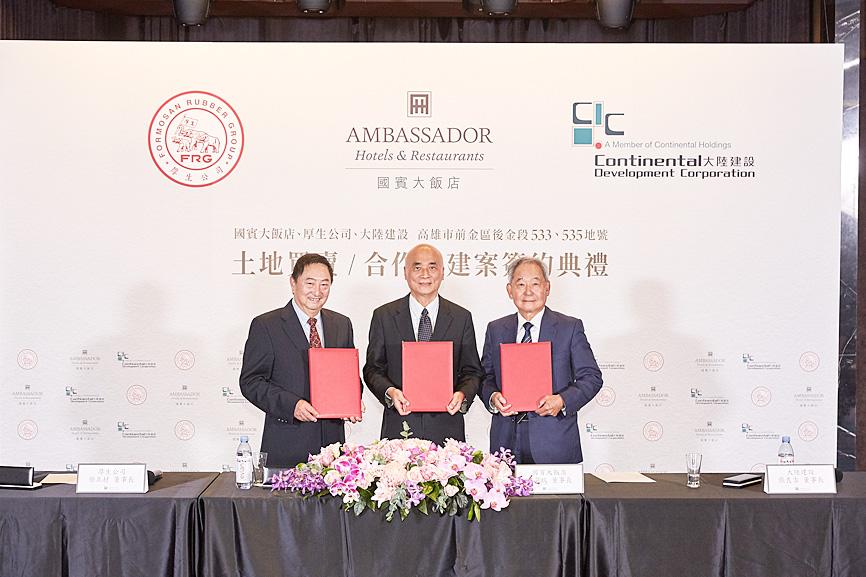Continental Development Corp (大陸建設) yesterday signed a deal with Formosan Rubber Group Inc (厚生公司) and Ambassador Hotels and Restaurants Ltd (國賓大飯店) to jointly repurpose the Ambassador Hotel Kaohsiung (高雄國賓飯店).
The developer and rubber product maker agreed to buy 20 percent and 30 percent of the plot from the hospitality provider respectively. They plan on turning the 40-year-old property into a mixed-use complex that features a hotel and serviced apartment units.
Ambassador Kaohsiung sits on a 2,026 ping (6,698m2) plot that would have favorable floor area ratios like other urban renewal projects, the companies said.

Photo courtesy of Continental Holdings Corp
Ambassador Hotels said it sold the land to Continental Development and Formosa Rubber for NT$2.4 billion (US$86.39 million) and would be able to divide 37 percent of the total floor area between the companies upon the project’s completion.
The government has encouraged the regeneration of old buildings, the hotel group said, adding that it believes it is wise to jump on the bandwagon and revitalize longstanding assets.
Urban hotels nationwide have also taken a hard hit from the COVID-19 pandemic, it said.
Continental Development said it would take charge of the project’s planning, construction and marketing, and later gain 63 percent of the floor space.
The Taipei-based developer recently sold a nearby luxury apartment complex, so it is confident about property development in the southern port city, it said, adding that the new project could hit the market two to three years from now.

RUN IT BACK: A succesful first project working with hyperscalers to design chips encouraged MediaTek to start a second project, aiming to hit stride in 2028 MediaTek Inc (聯發科), the world’s biggest smartphone chip supplier, yesterday said it is engaging a second hyperscaler to help design artificial intelligence (AI) accelerators used in data centers following a similar project expected to generate revenue streams soon. The first AI accelerator project is to bring in US$1 billion revenue next year and several billion US dollars more in 2027, MediaTek chief executive officer Rick Tsai (蔡力行) told a virtual investor conference yesterday. The second AI accelerator project is expected to contribute to revenue beginning in 2028, Tsai said. MediaTek yesterday raised its revenue forecast for the global AI accelerator used

TEMPORARY TRUCE: China has made concessions to ease rare earth trade controls, among others, while Washington holds fire on a 100% tariff on all Chinese goods China is effectively suspending implementation of additional export controls on rare earth metals and terminating investigations targeting US companies in the semiconductor supply chain, the White House announced. The White House on Saturday issued a fact sheet outlining some details of the trade pact agreed to earlier in the week by US President Donald Trump and Chinese President Xi Jinping (習近平) that aimed to ease tensions between the world’s two largest economies. Under the deal, China is to issue general licenses valid for exports of rare earths, gallium, germanium, antimony and graphite “for the benefit of US end users and their suppliers

Dutch chipmaker Nexperia BV’s China unit yesterday said that it had established sufficient inventories of finished goods and works-in-progress, and that its supply chain remained secure and stable after its parent halted wafer supplies. The Dutch company suspended supplies of wafers to its Chinese assembly plant a week ago, calling it “a direct consequence of the local management’s recent failure to comply with the agreed contractual payment terms,” Reuters reported on Friday last week. Its China unit called Nexperia’s suspension “unilateral” and “extremely irresponsible,” adding that the Dutch parent’s claim about contractual payment was “misleading and highly deceptive,” according to a statement

Artificial intelligence (AI) giant Nvidia Corp’s most advanced chips would be reserved for US companies and kept out of China and other countries, US President Donald Trump said. During an interview that aired on Sunday on CBS’ 60 Minutes program and in comments to reporters aboard Air Force One, Trump said only US customers should have access to the top-end Blackwell chips offered by Nvidia, the world’s most valuable company by market capitalization. “The most advanced, we will not let anybody have them other than the United States,” he told CBS, echoing remarks made earlier to reporters as he returned to Washington